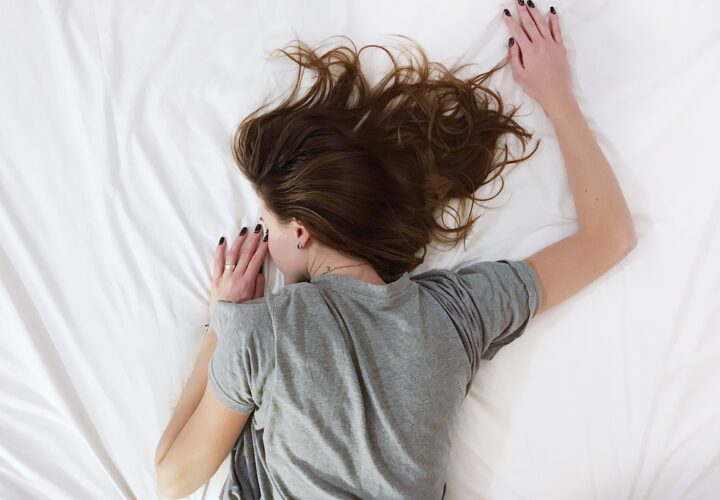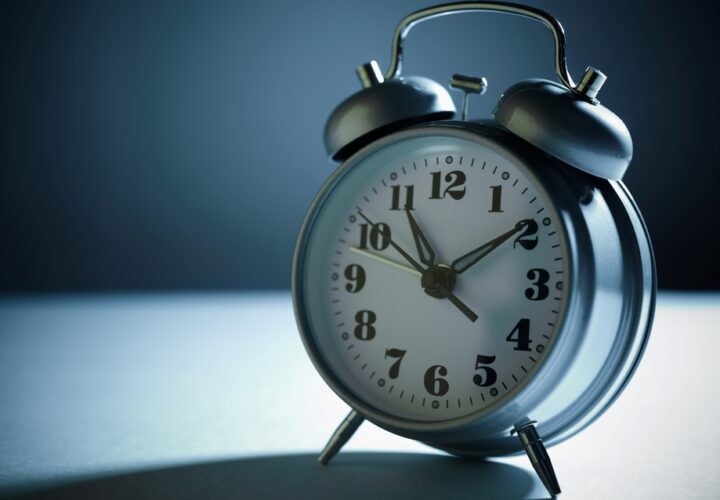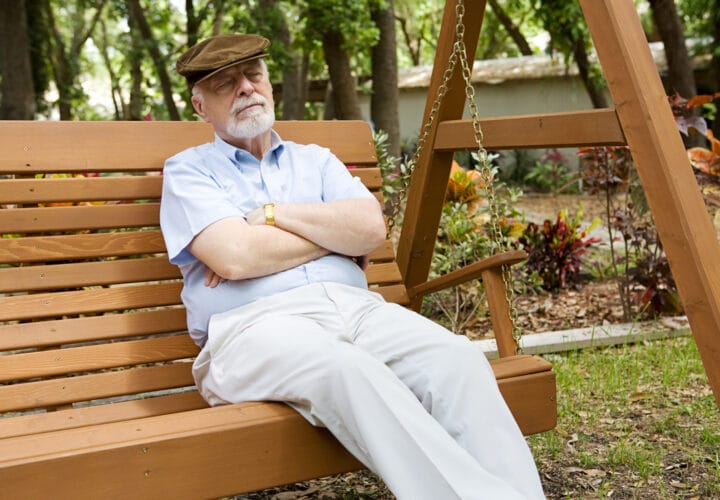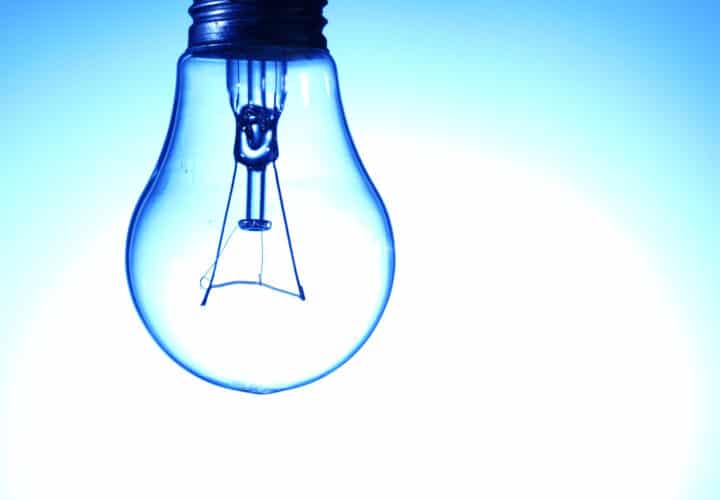We know some of the harmful effects of sleep deprivation, including an increased risk of getting into a car crash or even developing Alzheimer’s. But what happens inside of a sleep-deprived brain? Do new interventions that promise better sleep really work? We spoke to sleep scientist Dr. Daniel Gartenberg, Ph.D., about how technology and sound can be used to improve sleep quality.
- Sleep deprivation is linked to cancer, cardiovascular disease and neurodegenerative conditions like Alzheimer’s
- Research suggests that limited deep sleep is associated with a 40-percent decline in memory performance
- On average, 20 year olds get 20 percent of deep sleep as they slumber, but by age 80, this amount decreases to about 7.5 percent
- Gartenberg’s research shows that playing a sound mimicking the frequency of deep sleep brainwaves can increase the amount of deep sleep we get
Being Patient asked Gartenberg about how much sleep people should aim for per night, whether we can catch up on sleep after long periods of deprivation and how we can use technology to manipulate our brainwaves while we sleep, leading to more deep sleep.
Being Patient: How does sleep deprivation affect our brains?
Dr. Gartenberg: Sleep is like breathing and eating—something our body really needs to do. Every organ is impacted by sleep deprivation and research shows that it’s linked to almost every chronic illness, including cancer and cardiovascular disease; there are a lot of causal studies showing the relationship there. We’re going to talk about the link between sleep deprivation and Alzheimer’s. Sleep cleans out a lot of the bad plaques that build up during the day. Also, there are things [sleep affects] that you might not even think about. For example, you’re more sensitive to pain when you’re sleep deprived. It isn’t surprising that we have a hard time empathizing and are more likely to take risks when we’re sleep deprived. If you could improve your sleep a little bit, it will improve a whole swath of health needs, as well as your ability to perform cognitively at your job and in your life.
Being Patient: When we sleep, we associate new learning with old learning through a filing system in our hippocampus, and that’s how we make memories. When you’re sleep deprived, you’re not optimizing this system. Is that correct?
Dr. Gartenberg: I would get a little deeper into describing how the sleep stages work and what’s going on there. Throughout the night, you’ll cycle into light sleep, deep sleep, light sleep and then REM. You have about four to five of those cycles throughout the night and as you sleep, you gradually get less and less deep sleep. Deep sleep is thought to be the more regenerative aspect of sleep that’s associated with human growth hormones and memory abilities. If you get less deep sleep, it’s associated with a 40-percent decline in memory performance.
There’s this theory, probably the one that most people in the sleep field support, called the synaptic homeostasis hypothesis. It’s this idea that during the day, we build all these excitatory connections and associations between things that do or do not totally matter to your wellbeing and survival. During sleep, in deep sleep, you down-regulate all of those memories that happen during the day so that things that are more salient to your survival rise to the top. It used to be, oh, the predators in the jungle are in that area, don’t go over there. Now it’s like, oh, what did Mindy say about me on social media? All the things that are relevant to your personality and wellbeing get preferential treatment during deep sleep and then you replay and integrate that information during REM. That’s kind of what you talked about with integrating the new information from the day into your personality and old memories; that whole relationship has to do with a thing called sleep spindles [brainwaves that occur during stage 2 sleep], but also the hippocampus and transmission of information to that part of our brain.
Being Patient: Are we aiming for a longer period of deep sleep because it’s better for our brains?
Dr. Gartenberg: Yes. Most people think deep sleep is better. We like to think about deep sleep as the new fountain of youth. As you get older, the amount of deep sleep you get decreases by about 50 percent. The average deep sleep percent when you’re about 20 is usually around 20 percent of your deep sleep and by the time you’re 80, it’s around 7.5 percent. It’s hard to figure out what’s causally happening. Is it that aging is making you get less deep sleep, or you just need less deep sleep as you age?
There’s definitely something to these cool studies that involve exposing a mouse to a novel environment. They get more deep sleep that next night because deep sleep is how we integrate new information and it’s also how we do cell recovery, human growth hormones and other beneficial things for our body. It could be that if you were to stay more active cognitively as you get older and keep learning new information, picking up languages or doing crossword puzzles, that could help you get more deep sleep. There’s other interesting interventions that my team and I are exploring right now and how we can make people get a deeper night of sleep.
Being Patient: Can you catch up on sleep after a long period of sleep deprivation, or is the damage done once you go for a few years without quality sleep?
Dr. Gartenberg: You can’t make up for a night of sleep completely, but with that being said, if you are sleep deprived during the weekdays and binge on the weekends, it would be better to binge than to not binge. It is good to recover to some degree, but you’ll never fully get that sleep that you’ve lost back.
Another thing to think about is a modern western conception that you need to sleep continuously for 8 hours throughout the night. When I talk about sleep need, I’m talking about it over a 24-hour period. You can break up your sleep schedule throughout the day (e.g., getting two hours and then six hours later), but you also don’t want to mess up your circadian rhythm because if you have erratic sleep times, your sleep quality will get worse because it’s not aligning with your circadian rhythm. My circadian rhythm is set to midnight to 8 a.m. I’m a night person. You can shift your circadian rhythm, but you also have genes that dictate whether you’re a morning or an evening person; about 30 percent are morning, 30 percent are evening and 40 percent have a more flexible ability. You can shift it, sort of like with epigenetics, and your genes basically respond to your environment, based on sunlight exposure, timing of meals, exercise, energy exposure and even socializing late at night and being really stimulated during that time can shift your rhythm. The more regular your rhythm is, the better your sleep quality is going to be. That’s one intervention that I often give to my clients. I do coaching sessions sometimes and try to align when you should be alert and asleep, and that will inherently improve your sleep quality.
Being Patient: Aside from the accepted understanding that a poor night’s sleep can affect normal cognition during the following day or even more than one day, do you think improved sleep by itself can reduce the risk for Alzheimer’s disease?
Dr. Gartenberg: There is some causal evidence that would be the case. They’ve done a study where they’ve sleep deprived people and saw there’s an increase in beta-amyloid plaques when you are sleep deprived. That’s associated with Alzheimer’s.
Being Patient: We also have microglia, known as ‘the janitors of our brain,’ that come out when we’re sleeping and clean gunk out of our brain that shouldn’t be there. Could it be that if we’re sleep deprived, microglia aren’t as active and we may have a higher chance of getting plaque build-up?
Dr. Gartenberg: In general, sleep cleans out damaged cells in your brain. There’s strong evidence that it has a neuroprotective mechanism against things like Alzheimer’s. We have grants with the National Institute on Aging. We’re trying to study a population of people who are 70 and up to show that we can do these interventions that makes them have a better quality of sleep, that they’ll improve their memory performance and in the long-term, reduce the likelihood that they’ll get Alzheimer’s. It would be amazing if we could show that.
Being Patient: Should we aim for eight hours of sleep per night?
Dr. Gartenberg: Oftentimes, people want a straightforward answer to this question, but sleep need is a distribution on a bell curve. The American Academy of Sleep Medicine and the top 20 researchers in this field got together and wrote a consensus report that adults need at least seven to nine hours on a regular basis. That’s a big distribution and everyone’s a little bit different. Probably 99 percent of people need between seven and eight hours, 50 percent of people need between eight and eight and a half hours. In order to get that sleep amount, you need to allocate more time in bed than that. You said you wake up in the middle of the night, which a lot of people do, but if you’re staying up for a long time, maybe it’s more of a problem. It’s still considered healthy sleep if you spend more than 85 percent of time in bed asleep. That’s the cutoff for insomnia.
Being Patient: If we wake up in the middle of the night for 20 minutes and then go back to sleep, is that OK?
Dr. Gartenberg: I wouldn’t call that a problem.
Being Patient: What would you call a problem?
Dr. Gartenberg: That’s on the fringe. If it’s a half hour to an hour, I would call that more of a problem. It’s when we’re spending long portions of the time trying to fall asleep and not being able to, when it hits that 85 percent cutoff. I know it’s a little bit arbitrary, but that’s the clinical definition of when someone has a problem. We could always get better. The other side of the coin is that if you’re spending 100 percent of the time in bed sleeping, that’s probably indicative of you sleep depriving yourself because you’re so tired, you’re sleeping 100 percent of the time. You want to shoot for 90–95 percent.
Being Patient: How much control do we have over our sleep and what are some interventions we can use to improve our sleep?
Dr. Gartenberg: I’m imagining a future where you go to your doctor and instead of them prescribing some kind of sleep medicine to you, they give you a software intervention that’s shown to be more effective than the drug. There’s also not such great evidence for less invasive things like melatonin, but especially Ambien can be a really dangerous drug. The problem is that when people are older, they can fall down with some of these drugs.
We’re trying to build a software intervention and show that by manipulating sound, light and temperature while you’re sleeping and creating these optimal sleep habitats for people, their sleep will become more regenerative. A low-hanging fruit that we do with our software, Sonic Sleep, and a lot of people probably do this naturally, is to have a sound mask like a fan to block out noises that wake you up at night. We measure the sound in the room, like if your sleep partner is snoring, for example. Actually, your sleep partner is often a major source of sleep issues. We’ll adaptively play sounds based on what we’re measuring in the room that counter the snorer.
Being Patient: So instead of having separate bedrooms, we should replace the noise so that it blocks out the snoring?
Dr. Gartenberg: Maybe it will come to separate bedrooms at some point, but that’s what I would hope is a last resort. These Apple Watches and other devices are getting very accurate at measuring people’s physiology and we’ll be able to detect the snoring, and in real time, play a vibration that will get the person to roll over. A lot of times, when you roll over, you stop snoring.
There’s also this sexy finding in the literature that has motivated me for the past four years that shows you can play a sound that emulates the frequency of your brainwaves when your brain is in deep sleep. That frequency of deep sleep brainwaves are called delta waves. It’s a different way for the brain to process than in waking life. In waking life, our brainwaves are much higher frequency, like .8 hertz is a delta wave. That’s very long wavelengths. They’ve shown you could actually play a sound at the same pulse rate as those brainwaves. Since the brain is essentially electrical circuits, the auditory cortex picks up that sound, and the brain produces more of these delta waves.
Being Patient: Do delta waves appear when we’re in deep sleep? Are those the same delta waves that appear when we meditate?
Dr. Gartenberg: I would guess that if you’re getting delta waves when you’re meditating that you’re actually asleep. I think theta is more associated with meditation. Maybe the real yogis out there can do that, but I think for most people, you’re getting these regenerative delta waves when you’re asleep.
Being Patient: So your technology recreates the noise that will put us in the deep sleep stage?
Dr. Gartenberg: Yes, and the hard part about the science, and we understand the science better than anyone else, is how you play a sound so that your brain responds to the sound, but it doesn’t wake you up. If we play the sound too loud, we’ll wake the person up and that’s not going to be regenerative. We’ll stay up all night with our participants, look at their brainwaves on something called polysomnography, which is 16-channel EEG, and systematically play these sounds with people. You’ll see their brainwaves shifting into these more deep sleep states when we play these sounds with them. We know how to play the sounds at just the right sound pressure to produce these regenerative delta waves that are similar to the deep sleep brainwaves.
Being Patient: Are there multiple sound-wave patterns people can use to help them sleep?
Dr. Gartenberg: The sounds we use aren’t something that people would find very soothing in conscious life, but it’s all about the pulse rate. The sound comes on only for a brief period of time, like a 50-millisecond burst of sound. It’s all about the pulse rate that the sound is happening at because the brain is picking up on that pulse rate. We’ve manipulated a ton of different things in this experiment like the frequency and all these other things, but it’s the rate that the sound happens at which produces this effect in the brain.
Being Patient: Wouldn’t the sound you use wake people up?
Dr. Gartenberg: You hit the nail on the head. Everyone has a different arousal threshold and a bigger picture in what we’re trying to do is to create personalized interventions for people. We’ll creep up the sound over a very gradual period of time so it will start out almost imperceptibly to you, and then we’ll creep it up and can detect that it’s disturbing you way before you’re consciously aware of it. When we detect that disturbance, we’ll bring it down and find your auditory sweet spot for playing this sound. We have a version that works right now with the phone and with the Apple Watch. It will be even better because using heart rate, we can learn these things.
Being Patient: Is there any technology that’s available right now?
Dr. Gartenberg: In Sonic Sleep, we have the sound mask and the deep sleep simulation going off based on a timer, and the fact you’re most likely to be in deep sleep during that first cycle of sleep. That’s how we’ve implemented it so far.
In the next month or two, we’re rolling out this Apple Watch and publishing a paper that shows our algorithm is more accurate than the Fitbit and some of these other clinical-grade devices. It’s not just more accurate after you wake up and it tells you, you’ve got X-amount of deep sleep, but people think, who cares? What can I do with that? We’re trying to do this in real time so we know what stage of sleep you’re in, in real time, and we can do X-Y intervention to try and make it more regenerative.
Being Patient: You mentioned people have different sleep needs. How would we know how much deep sleep versus REM sleep and other stages we need?
Dr. Gartenberg: More deep sleep is better, in general. Deep sleep is tied to REM as well. If you’re getting a lot of deep sleep, you’ll be getting a lot of REM. When we get older, you exchange deep sleep for light sleep. Certain people have sleep disorders and it’s a little bit different, but for the general population, you want more REM and deep sleep. Also, if you’re dealing with a personal problem or are recovering from an illness, it’s not just personalized where you need a certain amount every night; you may need a different amount in different circumstances as well, so it gets a little bit complicated.
Being Patient: Patients with Alzheimer’s have a decreased ability to generate delta responses during sleep. Could it be that sleep disruption is an effect rather than a cause of Alzheimer’s?
Dr. Gartenberg: Understanding the causal relationship here is the hard part of doing the science. In the study I referenced before, they systematically manipulated, not deep sleep, but sleep duration. That’s what almost every study has done. It’s pretty difficult to manipulate deep sleep. That’s a more difficult study to conduct. We have run that study, where we’ll systematically disturb deep sleep and try to show different cognitive outcomes throughout the day. Doing that in Alzheimer’s populations is almost an amoral study to run because they’re already having this problem and we don’t want to exacerbate it more. I don’t think that study has ever been run as far as I know.
Being Patient: What do you think about the impact of alcohol on sleep?
Dr. Gartenberg: Alcohol is bad. It definitely disrupts your sleep. Also, marijuana negatively impacts your sleep in the sense that you get less REM, which is not good. I’m not a medical doctor, but if you’re someone who has racing thoughts for hours and something like CBD or marijuana helps you, it might be better for you to do it than to not do it. I’m really interested in the CBD thing because I’m pretty sure that only the psychoactive aspect of cannabis is what makes you have less REM sleep. I’m still trying to understand this and explore it more, but I don’t think CBD would have the negative aspects that smoking marijuana would in terms of disrupting your sleep quality.
Being Patient: With sleeping aids like Ambien, do our brains go through the same sleep process or does the process mimic sleep?
Dr. Gartenberg: One of the problems with some of these drugs is that a lot of times, you’ll perceive that you’re sleeping better, but some of these drugs negatively impact your sleep quality and you’ll have no conscious awareness of that. People are really bad at evaluating their own sleep. In our study, we’ll disrupt someone’s sleep hundreds of times a night and they’ll have no conscious awareness at all. That’s how dead we are to the world when we’re sleeping sometimes. That’s the main problem with a drug like Ambien. There’s no long-term study that’s ever shown that Ambien has a benefit. It’s really meant for jet lag and stuff like that.
Being Patient: What’s the best thing we can do to improve our sleep?
Dr. Gartenberg: Having a regular schedule and getting sunlight exposure in the morning is something really easy you can do. Research also suggests having an elevated temperature throughout the day, whether it’s through exercise or going into a sauna, helps. It can make you have more deep sleep. Also, think about your sound environment and make sure it’s a quiet, cool and dark place when you’re sleeping.
This interview has been edited for clarity and length.



